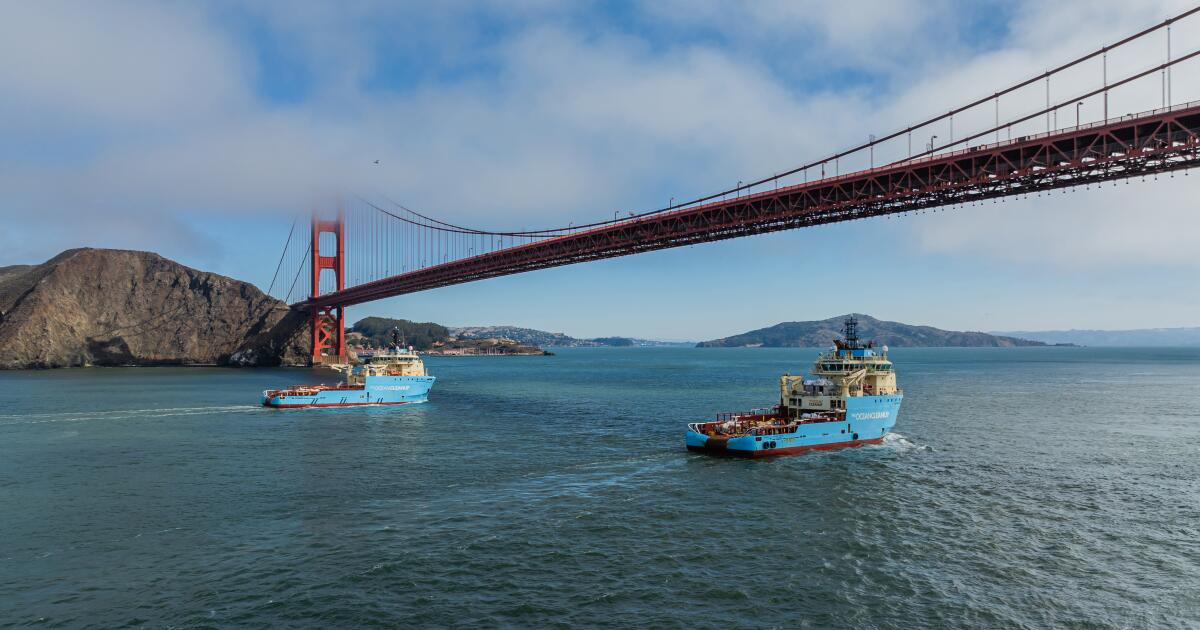After three years extracting plastic waste from the notorious Great Pacific Garbage Patch, an environmental nonprofit says it can finish the job within a decade, with a price tag of several billion dollars.
Twice the size of Texas, the mass of about 79,000 metric tons of plastic floating in the Pacific Ocean between California and Hawaii is growing at an exponential pace, according to researchers.
LA Times - News Source Context (Click to view Full Report)
Information for LA Times:
MBFC: Left-Center - Credibility: High - Factual Reporting: High - United States of America
Wikipedia about this sourceThat’s great news. It doesn’t say in the article but are they going to start on the Great Atlantic Garbage Patch after they are done?
This is a white-paper proposal for a clean-up effort that nobody wants to fund. The CEO of Ocean Cleanup has been pitching this fix since 2012. This isn’t even a new idea, its just been going through permutations of refinement since the initial proposal, with funding coming primarily from private independent donations. But we’re talking tens-of-millions raised on a project that needs 100x that amount.
And it does not appear to include the cost of physically processing the removed waste, just collecting and moving it to another location.
Given the stinginess of state governments when it comes to waste cleanup, I’m not holding my breath.
AT what cost? 80,000 tons of CO2 into the atmosphere wouldn’t surprise me…
80,000 tons of CO2 is better than 80,000 tons in the ocean, I guess.
Eliminated…or relocated. I assume relocated like when people go cleanup a park. They just shuffle the garbage to be someone else’s problem. Stop consuming please
Sure, but I’d rather have it relocated to a landfill where it’ll be kept out of the water supply and will eventually get covered with dirt and turned into a park or forest preserve.
Landfills aren’t just a hole in the ground people throw shit into. They’re complex, managed systems that efficiently store garbage and keep it sequestered while it breaks down over long periods of time.
You don’t buy anything and don’t have any trash?
Finally! Now no one can deny that Gojira song really IS about Great Britain.
I will be a billionaire in ten years by solving climate change and rolling back the clock on all human damage to the earth!
Money pweeeeese
There seems to be a basic math problem here - if it’s still growing at an exponential pace, any effort to clean it up will fail
Why don’t we focus on scaling those trash interceptors to every major river and harbor, to see if we can fix that math?
Most of the garbage comes from commercial fishing. So that won’t help.
At least that’ll correct itself when all the fish are dead, right?
…right?
I think this company has few different teams that work on the problem from different angles
Some are on the boats in the Pacific some are building interceptors in rivers in countries that are the largest producers of waste that makes it to the ocean. Of course they can’t fix the problem just slow it down. The fix comes from these countries changing how they allow garbage to be collected and stored.
There’s no reason to take this guy or his organization at face value when they make claims. It’s been hype and hopium for a decade now, fueled by TED Talks and wunderkind-loving media.
Cleaning up the garbage patch isn’t just a matter of collecting nicely floating big pieces of plastic. Doing that is good, but it’s not actually something that can ever get it to “clean”, it’s just something that helps slow the accumulation over time. You get the big stuff (relatively) easily, then it gets progressively harder, and eventually impossible.
Which is progress. It’s just not the lofty result they keep promising. If all it took was a big net and a relatively modest (by government standards) budget, this wouldn’t be a problem.
Yeah the article doesn’t contain a lot of information. However if the garbage patch is “growing at an exponential pace” and "In their three years at sea, the Ocean Cleanup vessels have removed more than a million pounds of trash, representing 0.5% of the total accumulation. ", then I’d say a little more effort would be required :(





